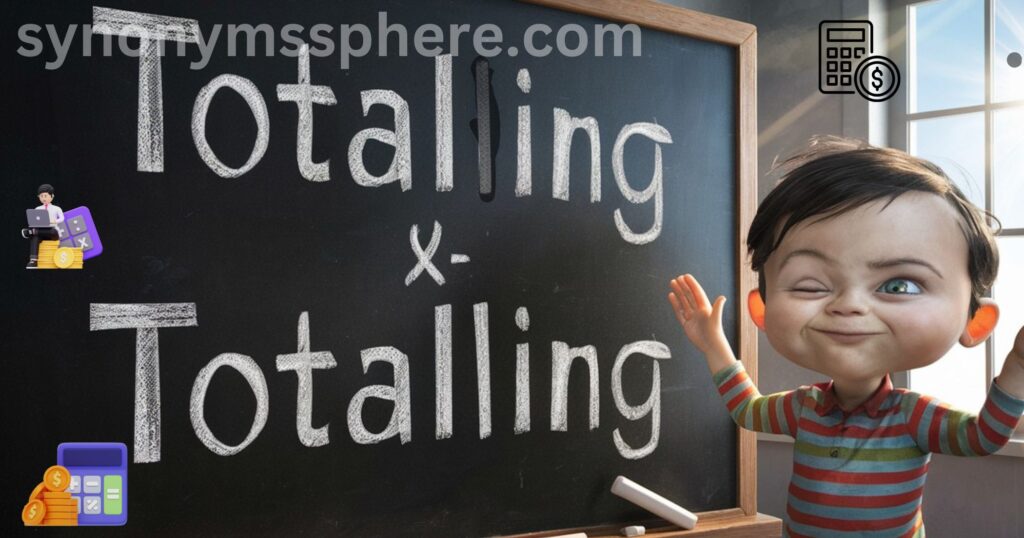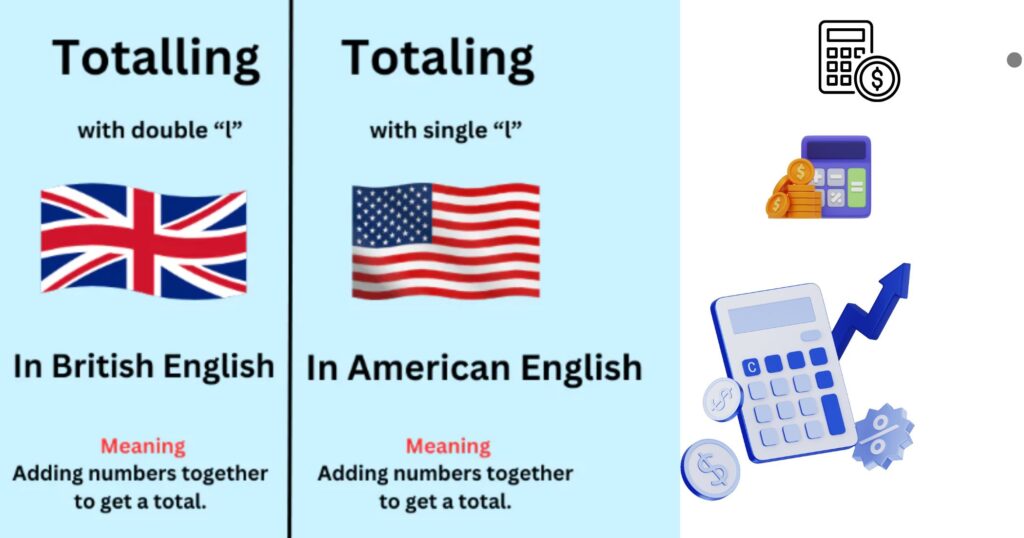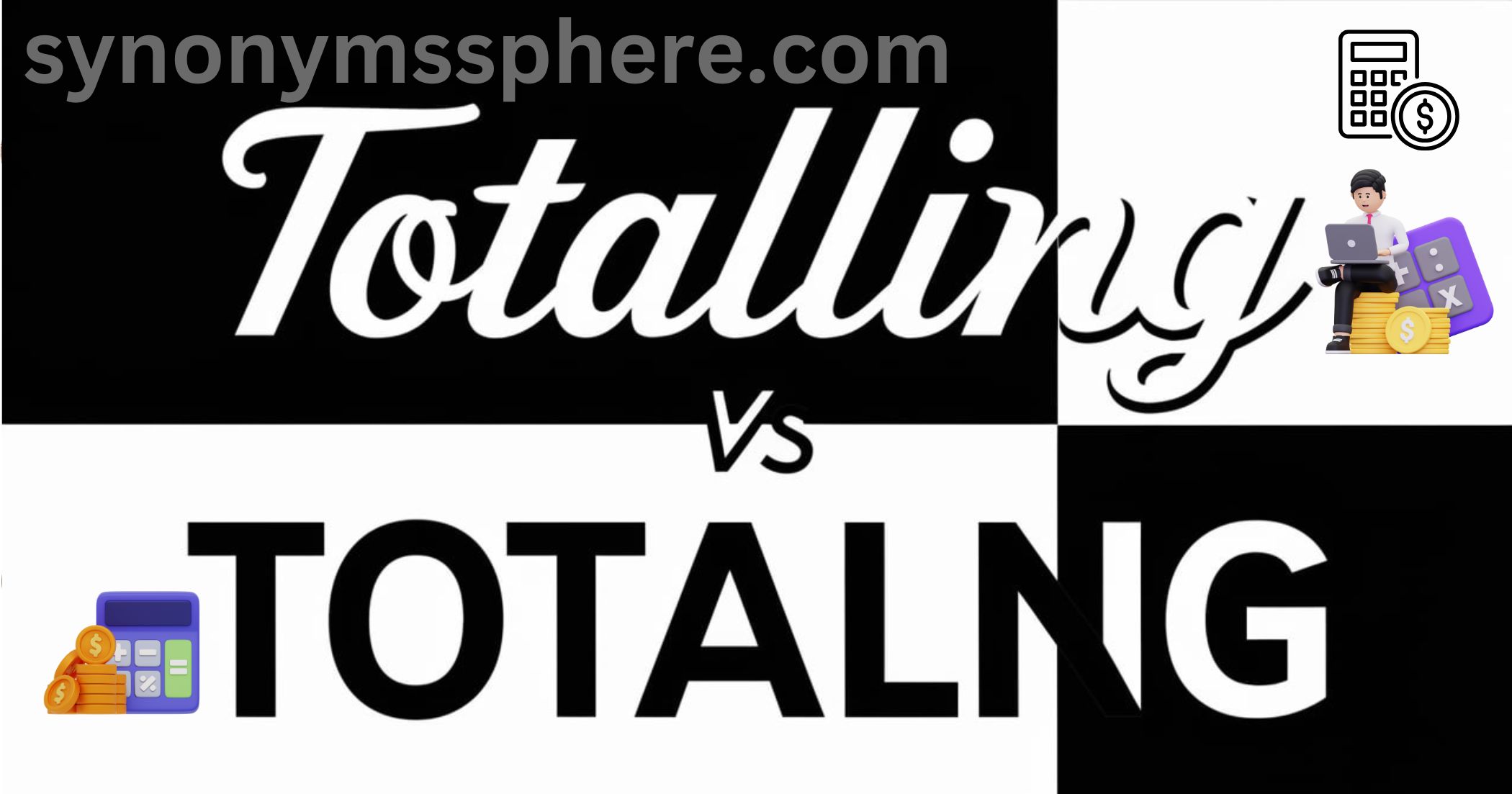Confused about whether to use “totalling” or “totaling” in your writing? These two words might look almost identical, but their usage depends on where you’re writing from. In British English, the preferred spelling is “totalling”, while in American English, you’re more likely to see “totaling Despite this slight difference, both words share the same meaning: adding up or calculating a total. Let’s explore these regional differences in detail so you can use the right spelling with confidence.
Totalling vs Totaling: The Key Difference

The difference between totalling and totaling lies in regional preferences. Totalling, spelled with a double “l,” is standard in British English spelling, while totaling, with a single “l,” is the accepted form in American English spelling.
This difference stems from the way English has evolved. British English tends to preserve traditional spellings influenced by French and Latin. American English, on the other hand, has simplified many spellings, thanks in part to the efforts of Noah Webster, who aimed to make English more phonetic and easier to learn. As a result, Americans drop the second “l” in totaling to simplify the word.
Both forms are correct, but using the appropriate one depends on the British vs American context of your audience.
The Correct Spelling of Totalling or Totaling
When deciding which spelling to use, consider your audience. If you are writing for a UK audience, use totalling, as it aligns with British preferences. For a US audience, use totaling.
For example:
- British English: “The totalling of expenses is complete.”
- American English: “The totaling of expenses is complete.”
Maintaining consistency in spelling is critical. Switching between totalling and totaling in the same document can confuse your readers and make your writing seem unpolished.
Example Scenario: Email to a British Client
Suppose you’re preparing a professional email for a British client. Here’s an example:
“Dear Mr. Smith,
Please confirm the totalling of project expenses for this quarter. Once finalized, we will move forward with the budget allocation.”
Using totalling ensures that your email aligns with UK audience preferences, enhancing clarity and professionalism.
Example Scenario: Email to an American Client
Now, consider an email for an American client. The phrasing might look like this:
“Dear Ms. Johnson,
Could you review the totaling of expenses for this quarter? Please share the final numbers by Friday.”
This version respects US audience preferences and follows American English spelling conventions.
Regional English Differences: British vs American English
The differences between British English spelling and American English spelling reflect historical and cultural influences. British English tends to retain older spellings, while American English embraces modernized forms.
For instance:
| British English | American English |
|---|---|
| Totalling | Totaling |
| Organise | Organize |
| Cheque | Check |
These distinctions extend to pronunciation, vocabulary, and grammar, making it important to consider your audience when writing.
The Influence of Noah Webster
The simplification of American English spelling owes much to Noah Webster, the creator of the first American dictionary. Webster believed that simplifying spellings would make English easier to learn and use. He proposed removing unnecessary letters, such as the second “l” in totalling, creating the American form totaling.
Webster’s reforms, including changes like color instead of colour and center instead of centre, form the foundation of modern spelling norms in the United States.
Synonyms of Totalling and Totaling
In addition to using totalling or totaling, you can vary your language by using synonyms. Here are a few options:
- Adding up numbers
- Calculating a sum
- Summing up
- Tallying figures
For example, instead of writing, “The totalling of expenses is complete,” you might say, “The adding up of numbers is finished.” Using synonyms for totalling and totaling can make your writing more engaging and diverse.
Example Scenario: Accounting Report
Let’s look at an example from accounting:
British English:
“The totalling of expenses for Q1 shows a 10% increase compared to last year.”
American English:
“The totaling of expenses for Q1 indicates a 10% rise over last year.”
Whether you’re working in accounting and finance terms or preparing a report, aligning your spelling with your audience ensures clarity and professionalism.
Usage in British vs American English

| Aspect | Totalling (British English) | Totaling (American English) |
| Spelling | Double “l” | Single “l” |
| Usage | Common in UK | Common in US |
| Meaning | The act of adding numbers | The act of adding numbers |
| Context | Used in British documents | Used in American documents |
| Examples | “The report is totalling…” | “The report is totaling…” |
| Style Guides | British style guides favor it | American style guides favor it |
| Regional Preference | British English preference | American English preference |
British Usage: Totalling in Accounting and Finance
In the UK, totalling is commonly used in formal contexts, such as financial reporting and accounting and finance terms. A British accountant might write, “The totalling of the company’s annual revenue is complete.”
American Usage: Totaling in Everyday Speech
In the US, totaling is more common and used in both professional and casual settings. For example, an American manager might say, “We’re totaling project expenses now.”
Accounting and Calculating Totals
The process of calculating a sum or adding up numbers is crucial in fields like accounting and project management. For instance, when preparing a financial report, you might write:
- “The totalling of all expenses is complete.” (British)
- “The totaling of all expenses is complete.” (American)
These examples show how important it is to follow spelling conventions in English to communicate effectively.
Spelling Conventions in English
English spelling conventions are shaped by centuries of evolution, influenced by history, culture, and reformers like Noah Webster. Adapting your spelling to fit regional spelling conventions ensures that your writing is professional and well-received.
For example, consider the following phrases:
- “The totalling of expenses aligns with British norms.”
- “The totaling of figures follows American practices.”
Understanding these nuances helps writers connect with their audiences.
Conclusion: Totalling or Totaling?
In the end, the choice between totalling and totaling comes down to your audience. Use totalling for a British audience and totaling for an American audience. Paying attention to these spelling rules and differences ensures clarity and professionalism in your communication.
By tailoring your writing to the British vs American context, you demonstrate respect for cultural differences and enhance your credibility. As language continues to evolve, mastering these variations remains a valuable skill for writers everywhere.
Read More
Casi Algo Meaning: Discover Its True Meaning and Examples
Momma vs Mama: Simple Grammar & Spelling Tips
IHH Meaning in Text: Simple Guide & Examples

Amelia – is a language lover, specializing in spelling, idioms, phrases, and metaphors, making complex concepts simple and fun.
